A Note for You, If You’re Having A Bad Day
My Dear Friend,
How are these January days treating you? January is a kind of sacred month for me these days; I find that less is expected of me and I get to curl up in the darkness, drinking a whole lot more tea and listening to a whole lot more moody piano.
There’s no smooth transition for this, so here it goes: Over the weekend, I rang in the new year with a slutty baby. This, unfortunately, is not a term I coined myself, but man, do I ever love it.
Let me back up to talk a little about my most controversial Instagram post to date. I posted it in early December, and it accrued almost 150 comments — unusually high for posts of mine, which tend to be gentle and innocuous and about birds or broccoli. I’m just going to put it here for you to read. Go ahead and read it, and have whatever feelings you are going to have about it, and then we will discuss.
Plenty of people — with and without children — liked the post, but there was a large camp who felt somewhere between irritated and incensed about it. Here were this camp’s main sentiments:
I didn’t ask for you to have kids. I don’t like kids. I didn’t sign up for a relationship with your children; I signed up for a relationship with you.
It is important to me that my decision to remain child-free is honored and respected just as much as your decision to have children is honored and respected.
Some people who don’t have kids long for children, but aren’t able to have them. For these people, being around friends and their children is heartbreaking. It is necessary for people who have children to be aware of this dynamic, and make child-free time for these friends.
All interesting points that bear conversation. Let’s go one by one.
It is bonkers to me that it is socially acceptable to say that you just don’t like all children. This is the most righteous I’m going to get here, but lest we forget: Among the types of people on earth, children have the least autonomy. There are laws to protect children, sure — but violence, war, poverty, racism, and abuse affect children disproportionately. Their brains are malleable; they’re learning every day what it means to be human. And still, they are whole individuals; each child is totally different from each other child. How can it be possible to declare that every single child on earth is simply not for you? Probably there will be someone who will try to answer this question for me in the comments, and maybe you’ll change my mind — but I feel like a human being is a human being, full stop. Human beings deserve kindness and unconditional positive regard, until they’ve individually violated trust. (And honestly, I think they deserve it even after that.)
As a sort of aside, the sentiment of “not signing up for” a relationship with a person’s children reminds me a lot of the way a lot of folks in polyamorous relationships find conflict. It’s fairly common for a person just beginning to explore ethical non-monogamy to complain, “I wanted a relationship with you, not with your whole polycule.” But I am yet to see a polyamorous relationship survive in this state: loving someone means you at least accept the people they choose to love. Bottom line: having children is exactly like polyamory, and I’ve been saying this for years.
But really, having a baby or a young child is in some ways more like having incurable body odor than it is like having another lover. This is a part of your life now. There is no way around it. Everyone in your life either needs to accept that this is just how you smell, and if they can’t tolerate it, then they really can’t be in your life. (Maybe you can occasionally talk on the phone.) I could continue walking this analogy out, because it’s a hill I’d die on, but I’ll spare you.
Which brings me to point two: It is, indeed, absolutely essential that people who have children celebrate and appreciate their friends who choose not to have children. There are no shortage of very good reasons to forgo having children, and loving someone means you respect whatever choice they make in this critical department. And!
I fundamentally believe that spending time (even just a little!) with children is good for human health. Children are simultaneously demanding and pure, and are therefore one of the best ways to divorce yourself from your ego for a little while. It is nourishing to attend to someone else’s needs and center someone else’s world. It’s uncomplicated, even if it might be a little inconvenient or annoying. Most of us choose to brush our teeth, even though it’s inconvenient or annoying; it would be much easier not to brush them at all. But our mouths are better because of the teeth-brushing; and our souls are better because of the children.
So what a gift that there are people who have chosen not to have children, and who might have an unmet need in their lives: CHILD TIME! Because parents unanimously benefit from having more loving, helpful adults around, and children absolutely benefit from meeting as many different kinds of adults as possible. I feel like everyone wins.
To point three: it’s a deep and gutting kind of devastating to wish for children and not be able to have them. (There is a Bluey episode about this, actually.) Luke and I tried to get pregnant for a long time before we succeeded (accidentally, as it were), and while we were trying, I felt heartbroken constantly. I have so many friends who have undergone round after round of IVF, to no avail. I have another close friend who froze her eggs but was unable to conceive — after twelve attempts. This is a special kind of grief. I won’t minimize it.
One thing sorely missing from our cultural conversation about children is actual conversation. Friends should be able to talk about this topic comfortably without feeling like they need to get defensive or fearing that they are going to be harshly judged. Rather than, “Big news: Sarah and I are trying to get pregnant! Hooray!” we could normalize, “Sarah and I are considering trying to get pregnant. What do you think about that?” Having a child should be a community conversation, rather than one between just two people. When more people feel like they’ve been a part of the planning process, a village can start to form. There should be space to say things like, “The idea of holding a baby terrifies me!”; “I feel excited for you, but also devastated for myself”; “I want to keep talking about the ways in which our relationship is going to change, and plan for it.”
I dream of living in a world where people feel enough comfort around children that they take true collective ownership over guiding and raising them; so that a child’s safety, wellbeing, and learning belongs significantly to everyone in the child’s life.
Nevertheless, there is truth in the fact that when a child is born (especially a first child), there’s a lot to mourn. A version of your life will end, whether you’re the person who’s having the baby or someone in proximity to the baby. There is so much emphasis on the blessed joy of everything that is beginning that we have no cultural space for the grief that comes from what will have to end. This can be confusing across the board; I’ve met parents who told me they didn’t get a chance to fully experience (or even really notice) their grief until their children were in elementary school, and they finally had a moment to look around and see what had changed. I know even more non-parents with no conceptual model for this kind of grief, so they confuse it for anger.
Towards the people unhappy with my Instagram post, I felt a strong sense of “yes and,” or, “both at once.” Yes, it’s hard when your friends have kids. Yes, all our choices are valid. Yes, so many situations are so different. AND: our communities do not need to fall apart when our lives change, even dramatically. We can find ways to find each other, and grow to embrace ways of loving each other that differ from those with which we might have been raised.
Back to the slutty baby.
When our friends Erin and Stephen had him, I noticed how immediately they invited people over to hold him. On the friend-Slack channel, Erin would post, “I’m alone for a few hours with C; does anyone want to come over and hold the baby?” And someone would inevitably post in response, “On my way!” In C’s baby book are dozens of photos of various people holding him. Erin and Stephen pass him around frequently, and so he is very comfortable being in the arms of strangers, in a way that my daughter was not at that age.
“Here,” I would say to Whoever-It-Was, as soon as T started to cry, “Let me just take her from you.” When C cried over the weekend, I watched Erin and Stephen let Whoever-It-Was dance with him, rock him, give him a bottle. What a simple, small thing that makes a huge difference in everyone’s lives. It enriches C’s life with lots of different smiles and smells and eye colors and bouncing rhythms; it benefits Erin’s and Stephen’s friends, who get to bond and build a relationship with a brand new human baby; and Erin and Stephen, whose hands and attentions are freed up to pour drinks for and hang out with other adults, are better for it, too.
To tell you the truth, I felt jealous. This was not how I raised my baby, even though I’d wanted to. But on the other hand, it wasn’t modeled for me! How lucky I am to grasp the wide breadth of this small-seeming decision to acquaint a baby with a ton of people, often. So anyway, I was telling Erin that I wanted to write about what she was doing. I got sort of didactic about it (just as I have here! With you! Now!). Erin nodded at me seriously.
“That’s an interesting thing to write about,” she said, “And I’m just curious if you’ll be using our chosen terminology for this method.”
“What is the terminology?” I asked.
“The Slutty Baby Philosophy,” she said. And as you now know, dear friend, the answer to that question was a HARD yes. May we all, whoever we are, fill our lives with slutty babies and friends who encourage their strumpetry.
I never mean to write this much to you, but here we are. Good luck out there, bravely facing all that breaks your heart.
Love,
Sophie
Housekeeping:
Does this newsletter mean something to you? Please forward it to a friend! If you’re not subscribed to a free or paid tier, please consider doing so! January is a tight month for teachers and for artists; what you give makes a difference.
I’m working on my book about kinship and ways to explode the nuclear family, and I’m actively interviewing people and seeking interviews. Do you live in a non-traditional family structure? Have you experimented with asking for help in new and interesting ways? Do you have mastery over boundaries? Have you read books or articles you think would be interesting for me to read? Do you know people I should interview? Respond to this email and let me know. Tell me what I should be reading, listening to, attending to, and following.
Loose Thoughts:
I’m marking the age as 26 months when my daughter first learned to identify three separate bird species: blue jay, cardinal, and chickadee. Usually, I’m awed by her development, but I’m not embarrassed to say that hearing her little voice go, “A cardinal!” Made me LITERALLY CRY TEARS OUT OF MY EYES.
Is it possible January is my FAVORITE MONTH? It IS possible. I am such a lover of sun and summer that I put quite a bit of pressure on the hot months. I put nothing on January. I just let it exist, and I am not actively teaching. For a few years, it’s been a bright spot for me.
My sister gave me a rice cooker for Christmas. I love it.

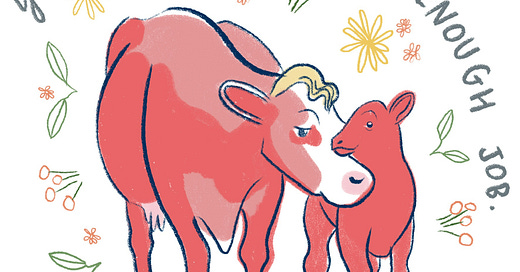



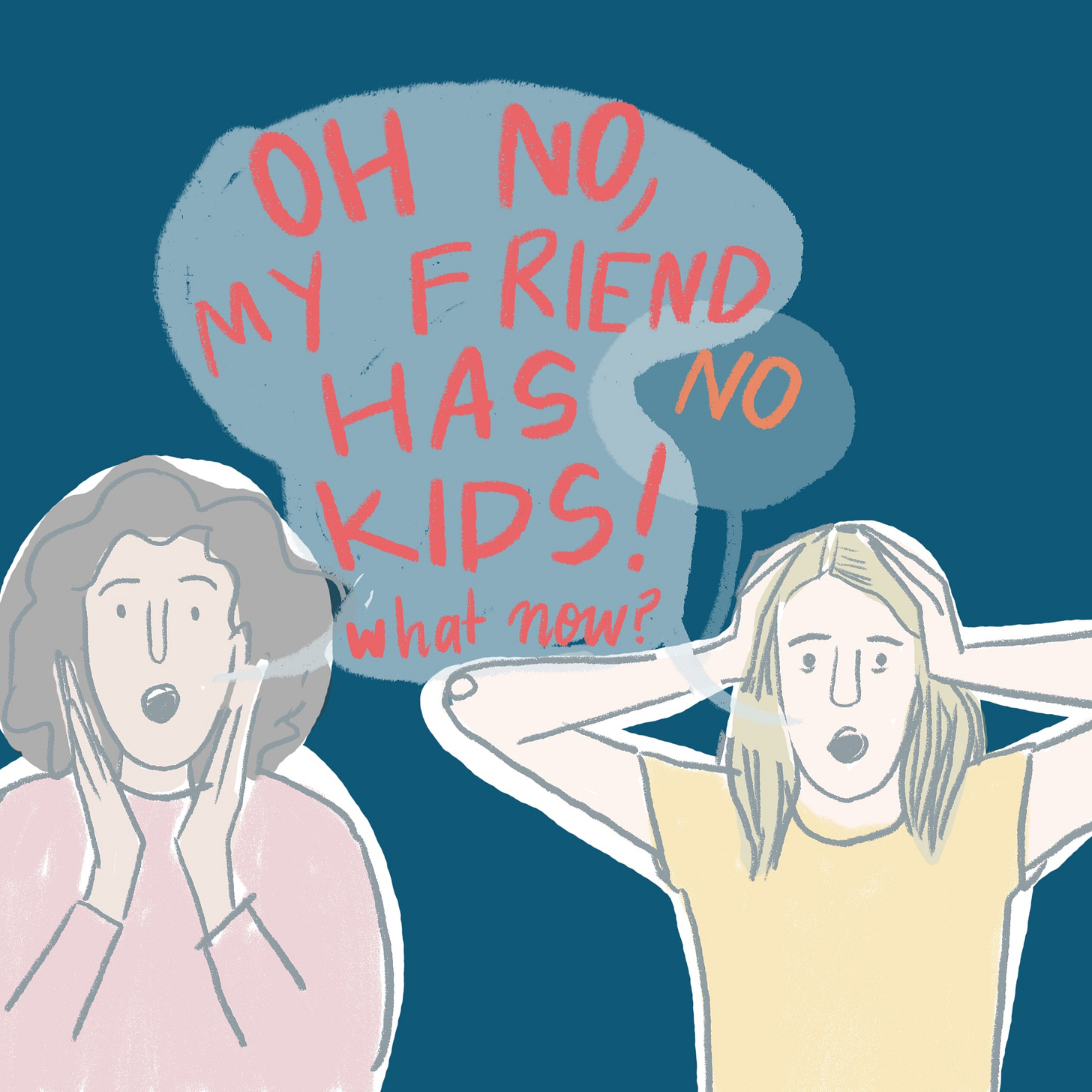
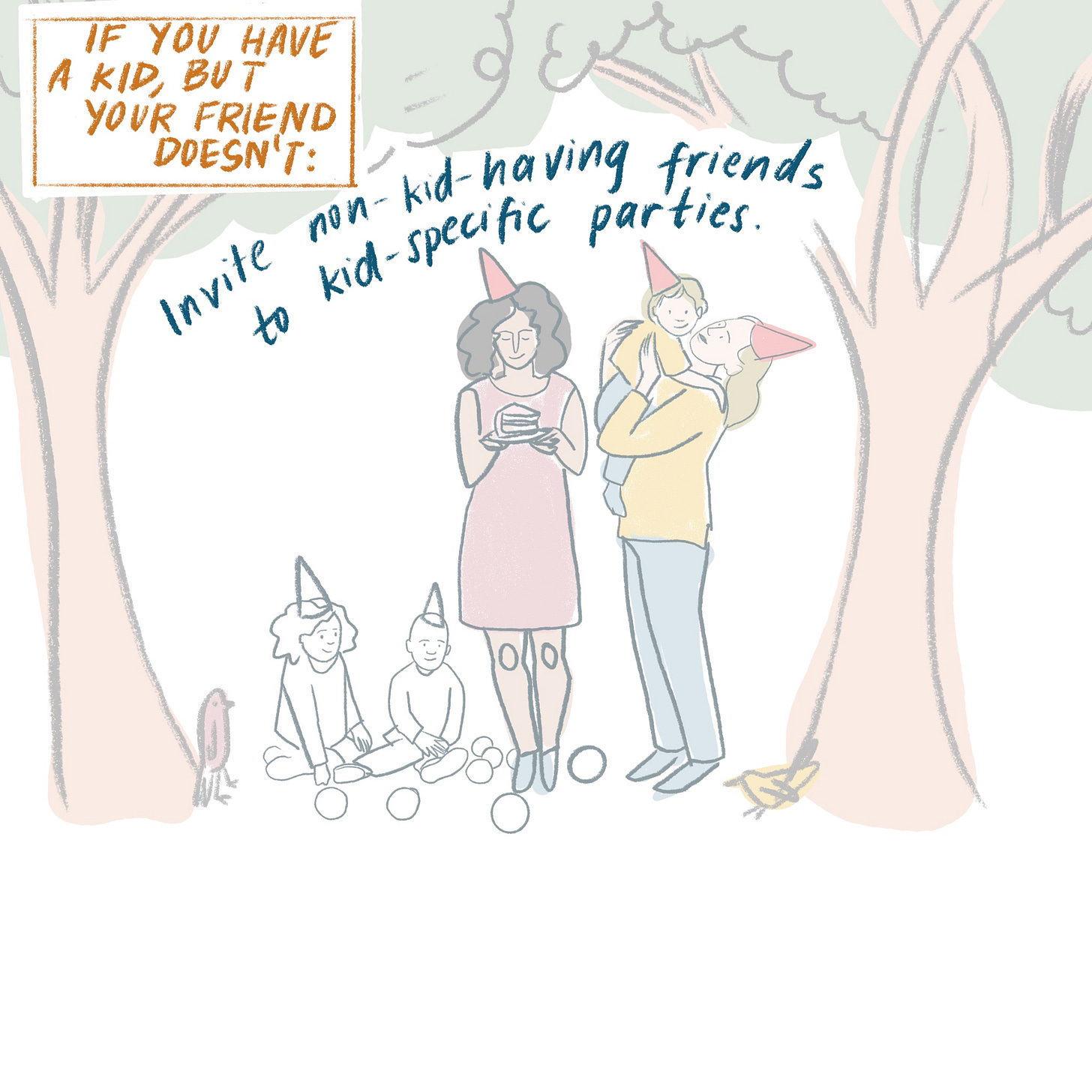
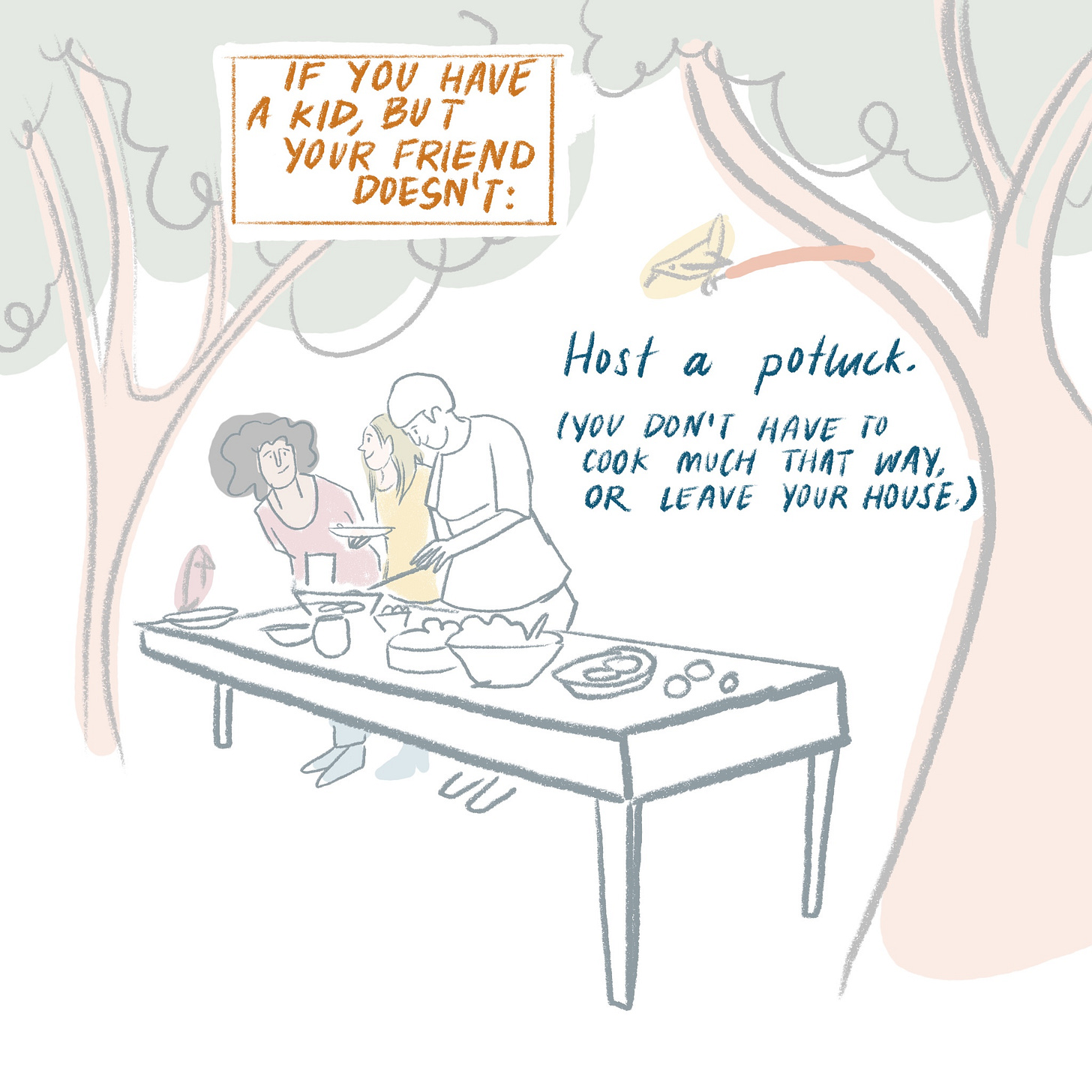
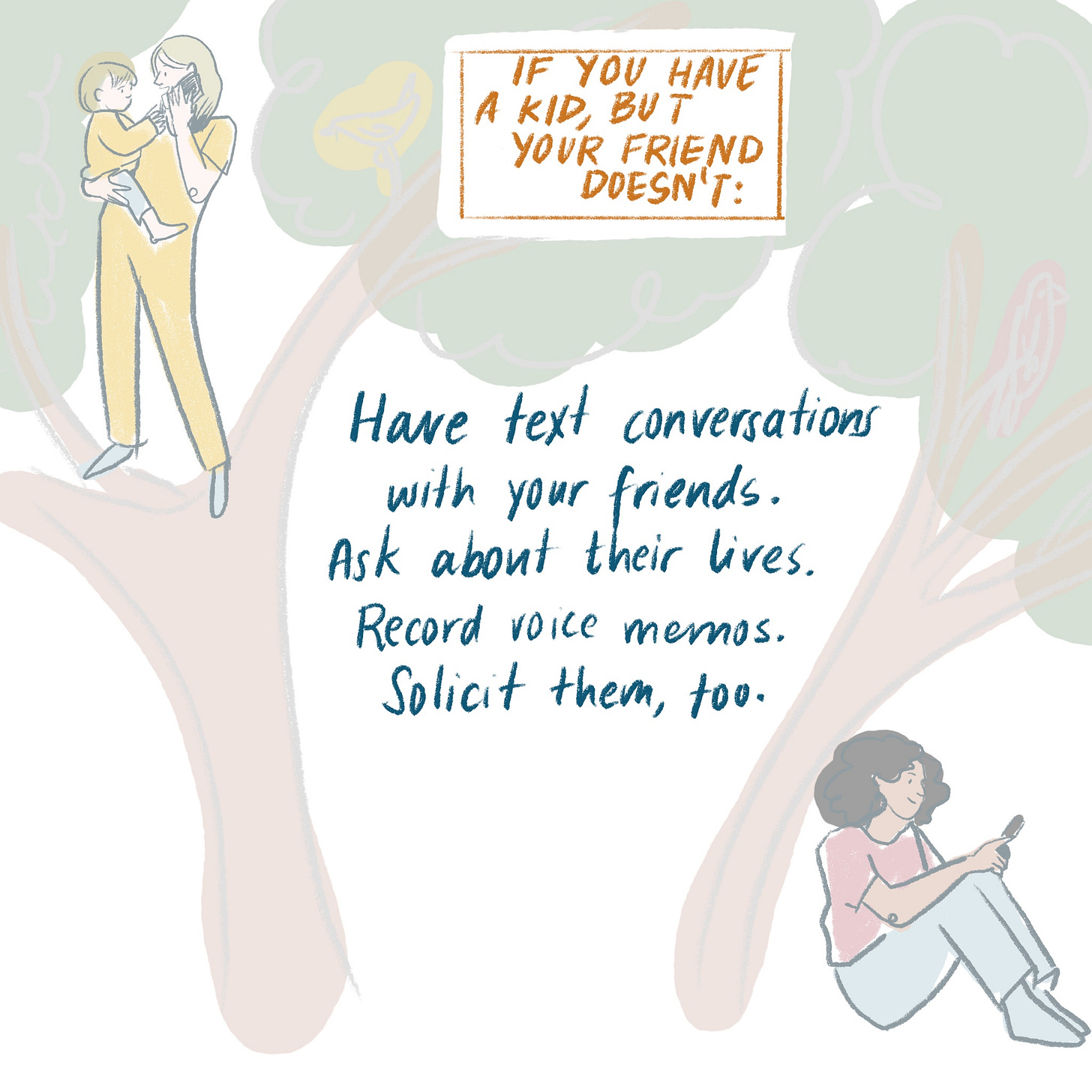
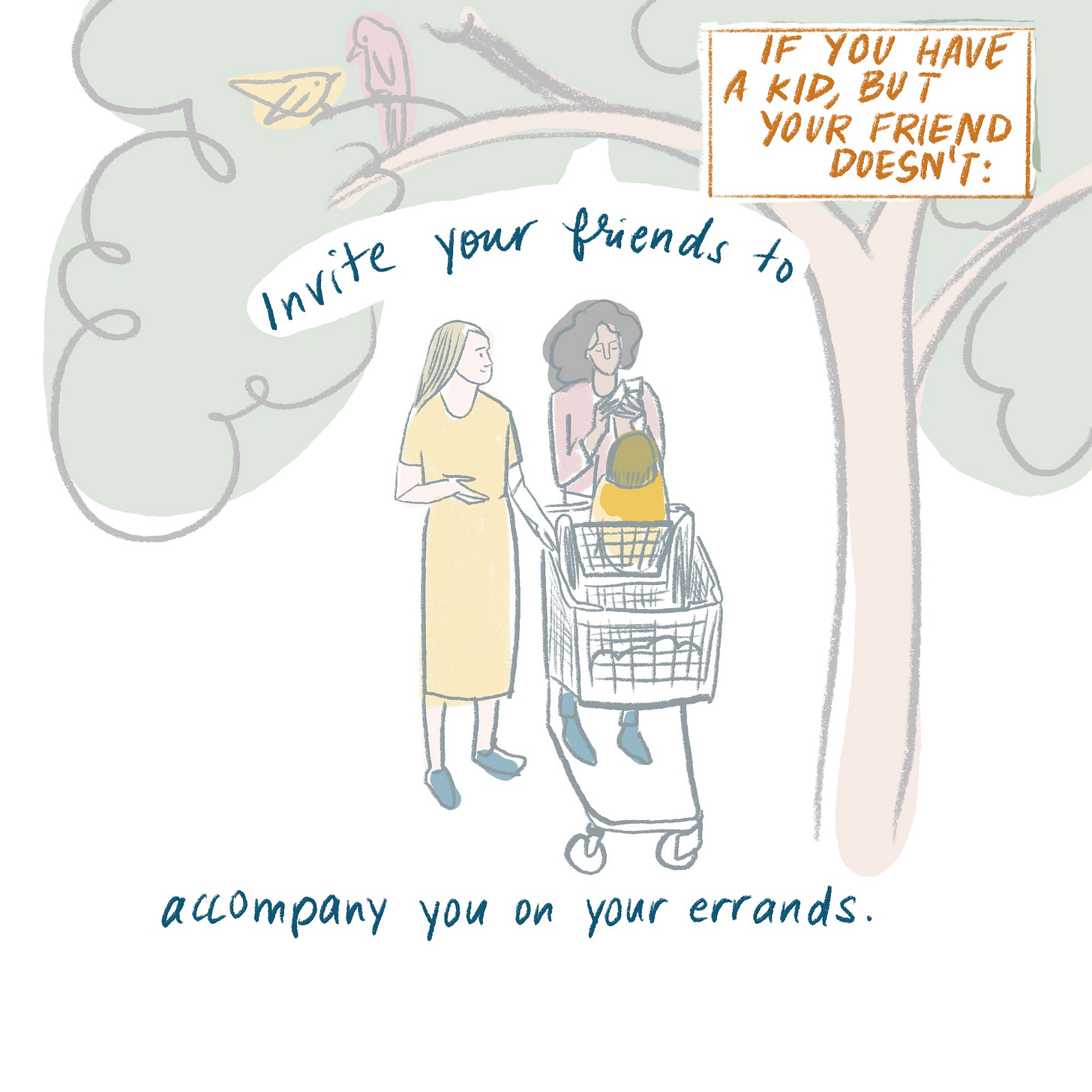
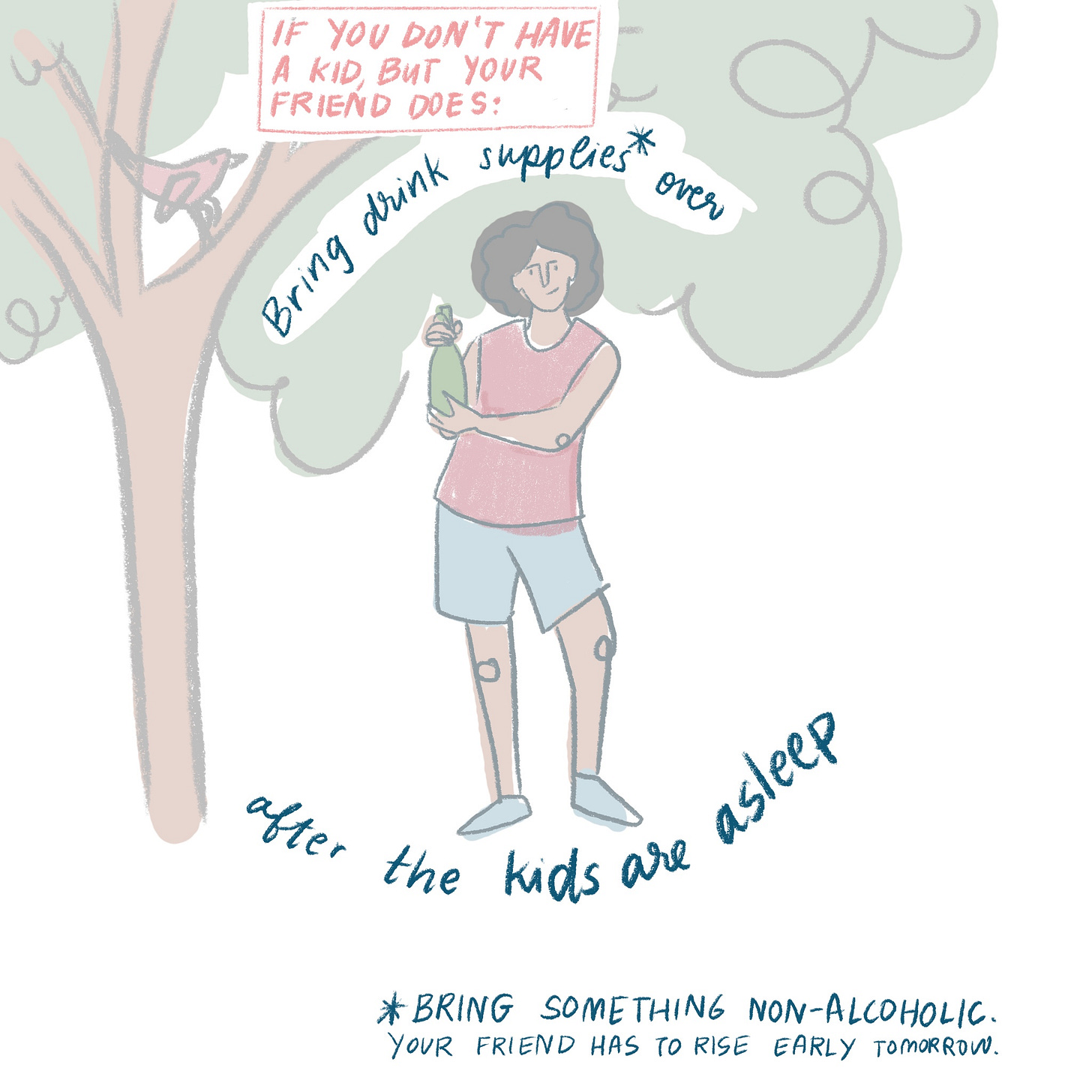
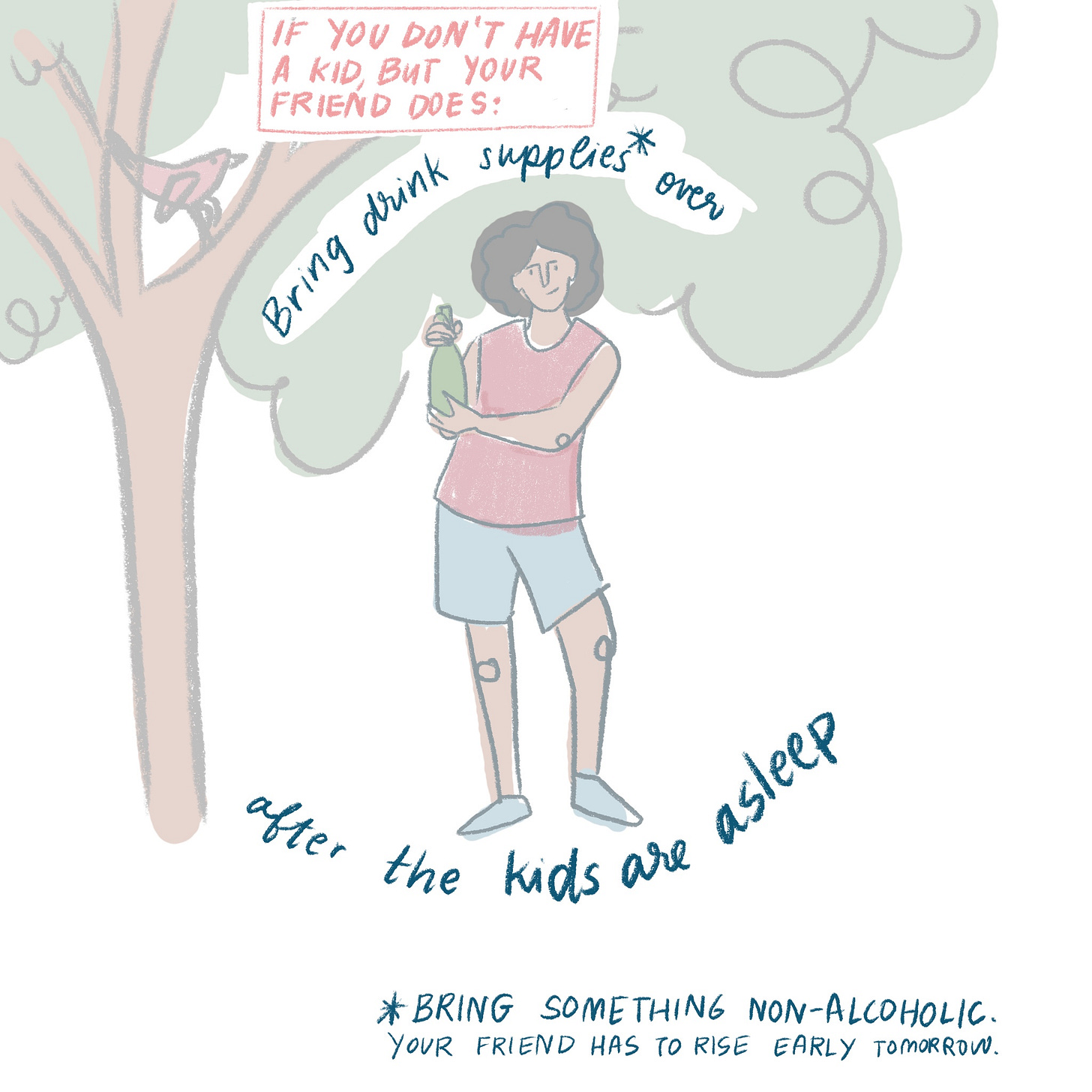
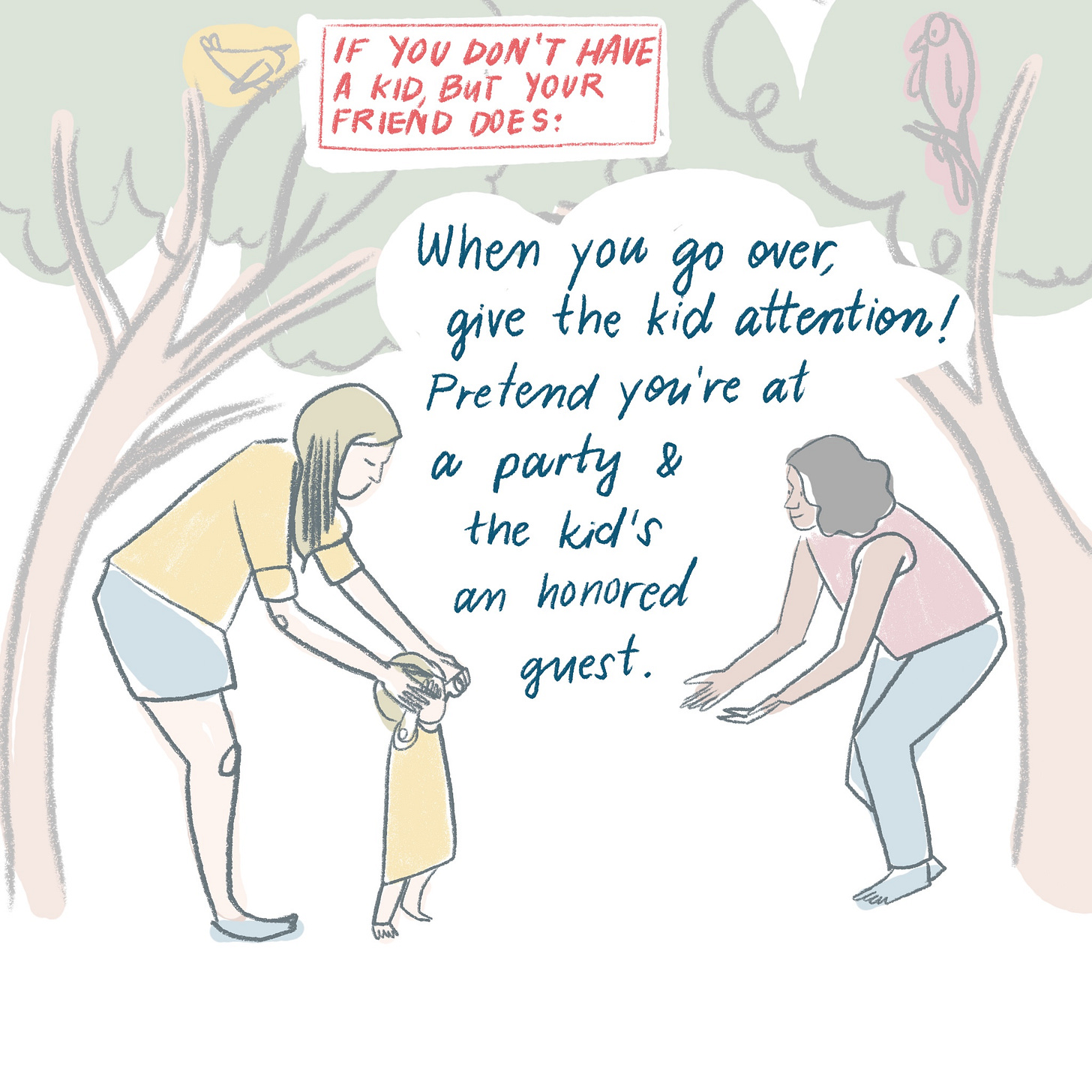
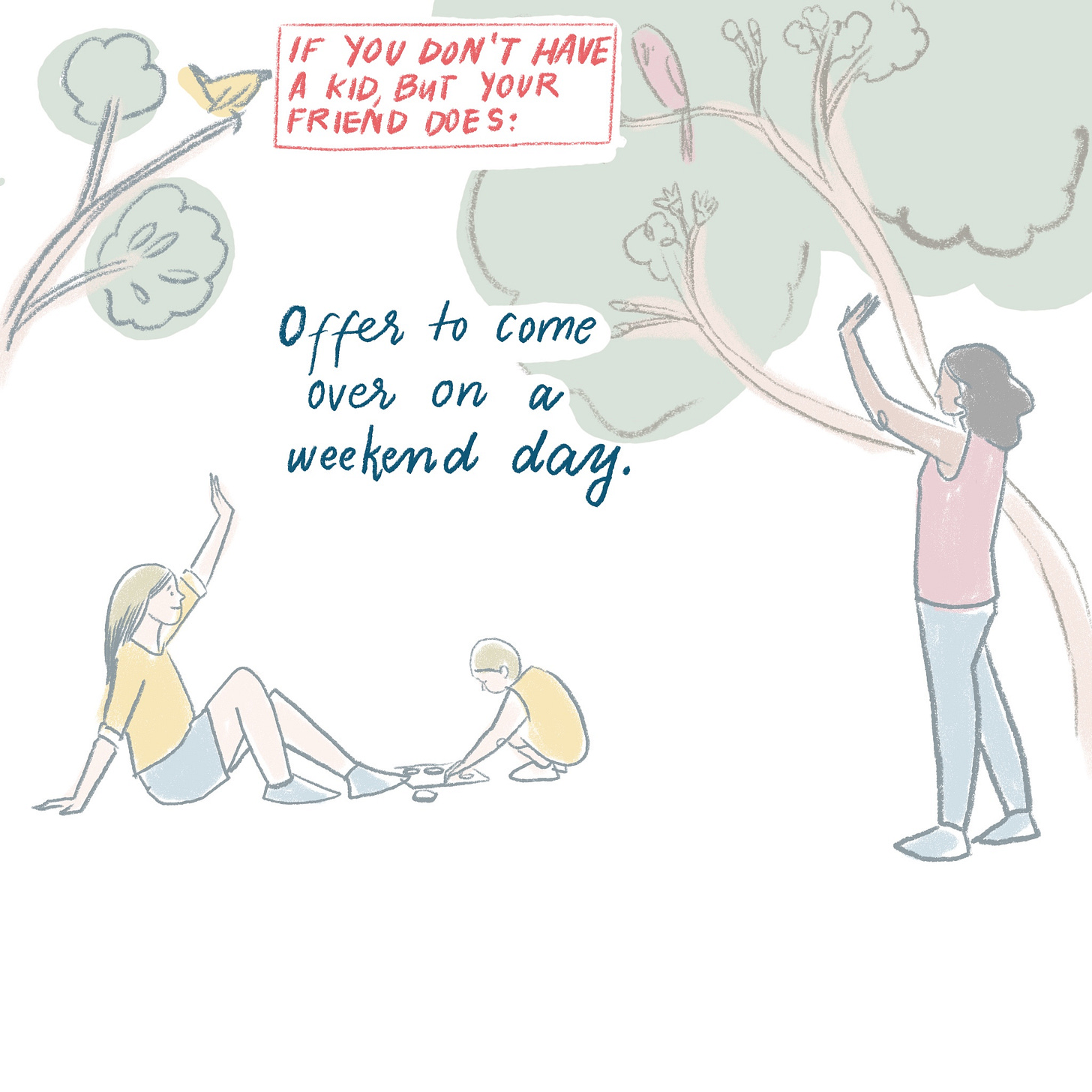



Oh boy, it is so interesting reading everyone’s thoughts this! I really appreciate both the original Instagram post And this newsletter about it And people’s responses to this newsletter! Here are some of my loose thoughts in no particular order:
It’s a shame that Instagram comments are so often finding the least generous interpretation of what someone is saying and then arguing from there. It feels like some sort of constructive debate exercise could baked into the app to combat this but that’s not really what social media is about.
I really feel like if our society in general was less emphatic about the nuclear family and having kids in general people would be less vehement about not liking kids. It strikes me that this is a sentiment I’ve heard almost entirely from women and I think it’s often in reaction to a presumption that they should love children and be instantly good with them. I hope as a society we are slowly getting better about planning women under this type of pressure.
I pride myself as being a good friend and had a partner who made it a priority for me to get baby-free time with my friends. Even so, The first year of my (now 1.5 year old) baby’s life when my friends and I got together was not good. My brain just felt like empty static. I didn’t want to be a cliché who only could talk about their kid but I didn’t have any anecdotes or jokes or ideas, I hadn’t listened to and music or seen any films. It was a very isolating combination of depression, anxiety and obliteration of identity and even though now I feel so much more myself I still would never be able to explain that feeling to my group of friends without kids. I was just showing up those 4 or 5 times to be a placeholder to maintain those friendships for a future self. But it felt as bad as it did good some of the time. That is in no way the fault of my friends, it’s just a hard true thing.
One thing I would recommend most of all for friendships regardless of child status is to live in proximity. It is such a game changer to just be living lives physically close by. One friend would ride her bike right past my house frequently and I would see her while taking by baby out for a walk in the awful early evening panic hour. Her just stopping to chat for 5 minutes or share a slice of watermelon on the stoop would absolutely make my day. Make your neighbours your friends, yes. But if you can make your friends your neighbours it will enrich your life infinitely.
Oh man. We need a phrase to describe when you stop what you're doing - in my case, drying my hair, an activity that takes forever - to go comment on a newsletter you just read. A "pause the pod" for the written word.
I appreciated the sentiment of the IG post at the time, though I definitely fell into the childfree irked camp. So many parents start ignoring their friends/talking only about their children and/or stop inviting their childfree friends to things because they "assume they don't want to hang out with kids." This is a hella two way street, but no one is responsible for representing both sides of everything, and I appreciated your perspective.
But let's go back to this: "It is bonkers to me that it is socially acceptable to say that you just don’t like all children."
Hooboy, the inhale I inhaled. If I had my Garmin on, I know it would've yelled at me to chill the fuck out.
I should add the necessary caveats before diving in. This weekend, I am writing letters to friends 3- and 6-year-old kiddos. I pretend they come from Maggie Modzelewski, Headmistress of the Cathedral of Learning Witchcraft and Wizardry. They are delivered by two stuffies I bought them when we toured the Cathedral of Learning together. I have holiday presents on my table for three other significant children in my life, "the boys," as I call them, the sons of two dear friends who are close to each other, close in age and luckily, close to me. I love these children.
But listen: I don't like children. I like and love and adore some individuals. I like the concept of them, the furthering of humanity, the many good things you raise. But I have never known how to hang out with them, even when I was one. (My kindergarten teacher made me a "room mother" because I was better at organizing than engaging.) I am bad at play. It drives me up a wall that I can't understand what they're saying.
There's a line in an essay I wrote about abortion where I'm remembering talking about finding out I was pregnant. "What am I going to do, have Whiskey watch the baby while I work like he’s Nana from Peter Fucking Pan? Also. I hate children."
Whiskey was my dog, and he was the only childcare I would've had available. But more importantly, it felt important to acknowledge that I am generally extremely unhappy spending more than 90 minutes with a child. A mother in my writing group commented, "You cannot mean this."
She's right. I don't hate children. But in a moment when I was deciding whether or not I wanted to have one, that's absolutely a flippant thing I would've said, and I feel zero shame about it.
Similarly, not liking children is a quick shorthand for the fact that, with individual and time-limited exceptions, I don't especially enjoy their company. I am happy to make the time and form relationships with my friends' kiddos. This, as you say, is part of life. But I cannot understand why there should be any more shame around generally not enjoying hanging around kids than not enjoying hanging around dogs. Dogs are great! They're soft and sweet and pure joy and love and light. Do I understand when someone doesn't want to hang out with my dog? No. But I'm not going to try to suggest it's bonkers, and would absolutely love it if people who dig spending time with teacup humans could extend the same courtesy.